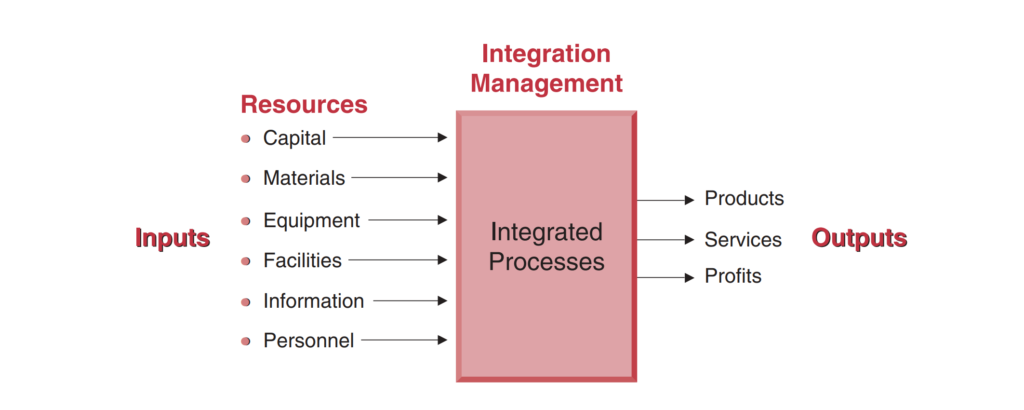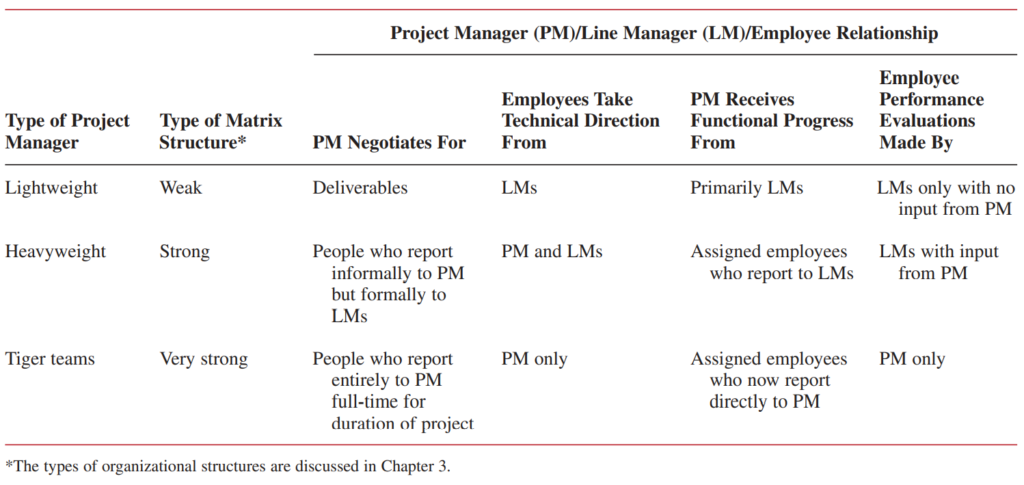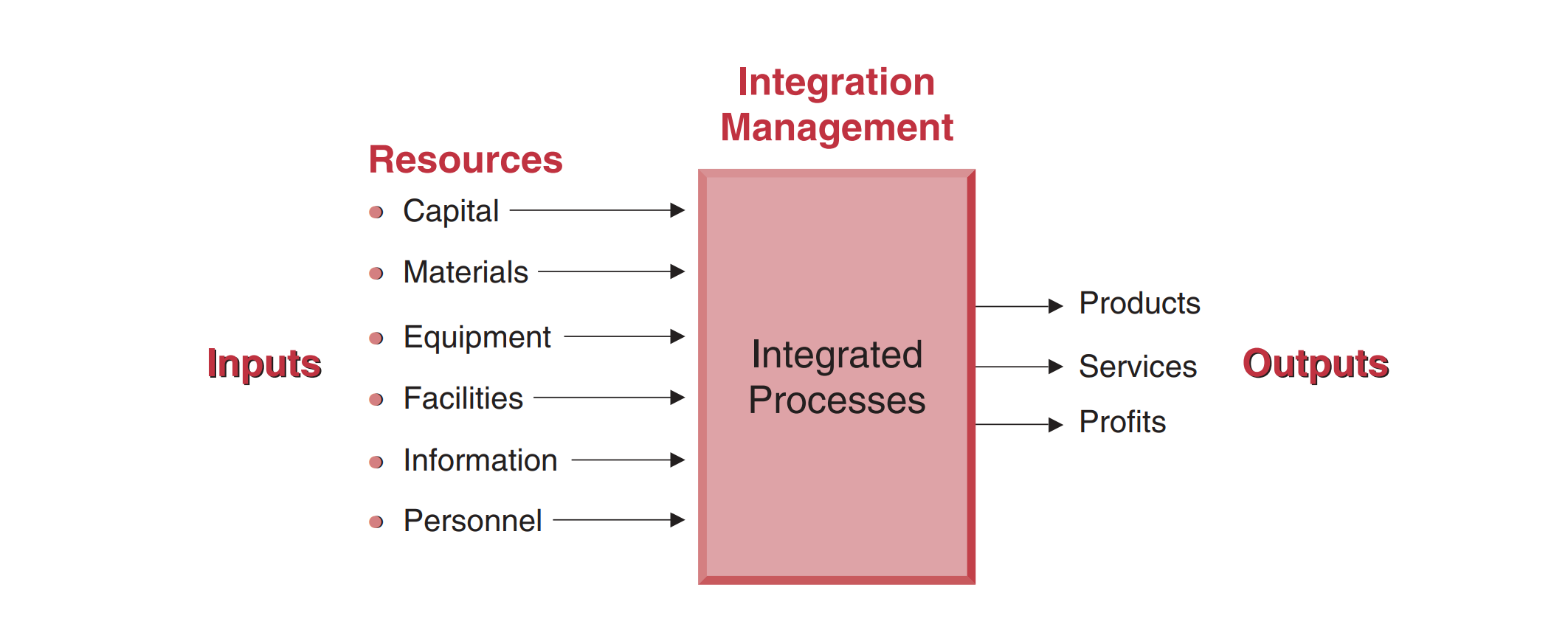DEFINING THE PROJECT MANAGER’S ROLE
The project manager is responsible for coordinating and integrating activities across multiple, functional lines. The integration activities performed by the project manager include:
● Integrating the activities necessary to develop a project plan
● Integrating the activities necessary to execute the plan
● Integrating the activities necessary to make changes to the plan
These integrative responsibilities are shown in Figure 1–3 where the project manager must convert the inputs (i.e., resources) into outputs of products, services, and ultimately profits.

In order to do this, the project manager needs strong communicative and interpersonal skills, must become familiar with the operations of each line organization, and must have knowledge of the technology being used.
An executive with a computer manufacturer stated that his company was looking externally for project managers.
When asked if he expected candidates to have a command of computer technology, the executive remarked: “You give me an individual who has good communicative skills and interpersonal skills, and I’ll give that individual a job. I can
teach people the technology and give them technical experts to assist them in decision making. But I cannot teach somebody how to work with people.”
The project manager’s job is not an easy one. Project managers may have increasing responsibility, but very little authority. This lack of authority can force them to “negotiate” with upper-level management as well as functional management for control of company resources. They may often be treated as outsiders by the formal organization.
In the project environment, everything seems to revolve about the project manager.
Although the project organization is a specialized, task-oriented entity, it cannot exist apart
from the traditional structure of the organization. The project manager, therefore, must
walk the fence between the two organizations. The term interface management is often
used for this role, which can be described as managing relationships:
● Within the project team
● Between the project team and the functional organizations
● Between the project team and senior management
● Between the project team and the customer’s organization, whether an internal or
external organization
To be effective as a project manager, an individual must have management as well as
technical skills. Because engineers often consider their careers limited in the functional disciplines, they look toward project management and project engineering as career path opportunities. But becoming a manager entails learning about psychology, human behavior, organizational behavior, interpersonal relations, and communications. MBA programs have come to the rescue of individuals desiring the background to be effective project
managers.
In the past, executives motivated and retained qualified personnel primarily with financial incentives. Today other ways are being used, such as a change in title or the promise of more challenging work. Perhaps the lowest turnover rates of any professions in the world are in project management and project engineering. In a project environment, the
project managers and project engineers get to see their project through from “birth to death.” Being able to see the fruits of one’s efforts is highly rewarding. A senior project manager in a construction company commented on why he never accepted a vice presidency that had been offered to him: “I can take my children and grandchildren into ten
countries in the world and show them facilities that I have built as the project manager. What do I show my kids as an executive? The size of my office? My bank account? A stockholder’s report?”
The project manager is actually a general manager and gets to know the total operation of the company. In fact, project managers get to know more about the total operation of a company than most executives. That is why project management is often used as a training ground to prepare future general managers who will be capable of filling top management positions.
DEFINING THE FUNCTIONAL MANAGER’S ROLE
Assuming that the project and functional managers are not the same person, we can identify a specific role for the functional manager. There are three elements to this role:
● The functional manager has the responsibility to define how the task will be done
and where the task will be done (i.e., the technical criteria).
● The functional manager has the responsibility to provide sufficient resources to accomplish the objective within the project’s constraints (i.e., who will get the job
done).
● The functional manager has the responsibility for the deliverable.
In other words, once the project manager identifies the requirements for the project (i.e., what work has to be done and the constraints), it becomes the line manager’s responsibility to identify the technical criteria. Except perhaps in R&D efforts, the line manager should be the recognized technical expert. If the line manager believes that certain technical portions of the project manager’s requirements are unsound, then the line manager has the right, by virtue of his expertise, to take exception and plead his case to a higher authority.
In previous Section [ INTRODUCTION ] we stated that all resources (including personnel) are controlled by the line manager. The project manager has the right to request specific staff, but the final appointments rest with line managers. It helps if project managers understand the line manager’s problems:
● Unlimited work requests (especially during competitive bidding)
● Predetermined deadlines
● All requests having a high priority
● Limited number of resources
● Limited availability of resources
● Unscheduled changes in the project plan
● Unpredicted lack of progress
● Unplanned absence of resources
● Unplanned breakdown of resources
● Unplanned loss of resources
● Unplanned turnover of personnel
Only in a very few industries will the line manager be able to identify to the project manager in advance exactly what resources will be available when the project is scheduled to begin. It is not important for the project manager to have the best available resources. Functional managers should not commit to certain people’s availability. Rather, the functional manager should commit to achieving his portion of the objective within time, cost, and performance even if he has to use average or below-average personnel. If the project manager is unhappy with the assigned functional resources, then the project manager should closely track that portion of the project. Only if and when the project manager is convinced by the evidence that the assigned resources are unacceptable should he confront the line manager and demand better resources.
The fact that a project manager is assigned does not relieve the line manager of his
functional responsibility to perform. If a functional manager assigns resources such that
the constraints are not met, then both the project and functional managers will be blamed.
One company is even considering evaluating line managers for merit increases and promotion based on how often they have lived up to their commitments to the project managers. Therefore, it is extremely valuable to everyone concerned to have all project commitments made visible to all.
Some companies carry the concept of commitments to extremes. An aircraft components manufacturer has a Commitment Department headed by a second-level manager. The function of the Commitment Department is to track how well the line managers keep their promises to the project managers. The department manager reports directly to the vice president of the division. In this company, line managers are extremely careful and cautious in making commitments, but do everything possible to meet deliverables. This same company has gone so far as to tell both project and line personnel that they run the risk of being discharged from the company for burying a problem
rather than bringing the problem to the surface immediately.
Project management is designed to have shared authority and responsibility between
the project and line managers. Project managers plan, monitor, and control the project,
whereas functional managers perform the work. Table 1–1 shows this shared responsibility. The one exception to Table 1–1 occurs when the project and line managers are the same person. This situation, which happens more often than not, creates a conflict of interest. If a line manager has to assign resources to six projects, one of which is under his direct control, he might save the best resources for his project. In this case, his project will be a success at the expense of all of the other projects.

The exact relationship between project and line managers is of paramount importance in project management where multiple-boss reporting prevails. Table 1–2 shows that the relationship between project and line managers is not always in balance and thus, of course, has a bearing on who exerts more influence over the assigned functional
employees.

Source : Project management A system approach to planning, scheduling and controlling [EIGHTH EDITION] By HAROLD KERZNER, Ph.D.
